Evidence-Based Mental Health Care for Katie: An Essay
VerifiedAdded on 2023/01/12
|8
|2386
|38
Essay
AI Summary
This essay explores evidence-based mental health nursing care and management, using Katie's case as a primary example. It begins with an introduction to mental health, emphasizing its cognitive, emotional, and behavioral aspects, and the importance of a balanced lifestyle for psychological well-being. The essay delves into Katie's case, a 25-year-old woman with a history of major depressive disorder, detailing her symptoms, assessment by mental health nurses and psychiatrists, and the provisional diagnosis of a major depressive disorder. The discussion covers both pharmacological interventions, such as amitriptyline, and non-pharmacological interventions, including various therapies and activities. The essay also highlights the importance of consumer perspectives in healthcare, and the significance of discharge planning and relapse prevention strategies for patients like Katie. It concludes by summarizing the key aspects of mental health care, the effectiveness of evidence-based practices, and the importance of holistic approaches to treatment and recovery.
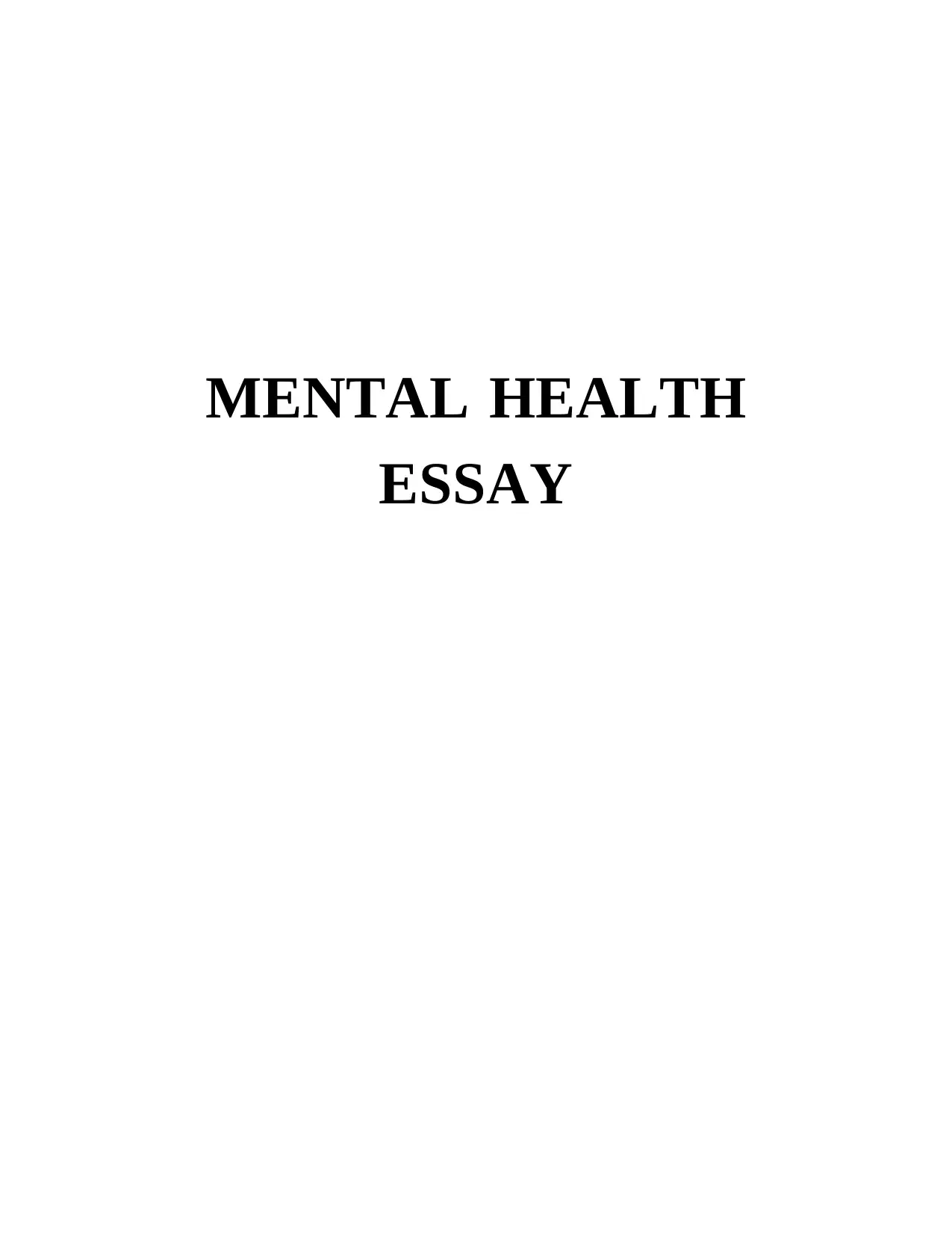
MENTAL HEALTH
ESSAY
ESSAY
Paraphrase This Document
Need a fresh take? Get an instant paraphrase of this document with our AI Paraphraser
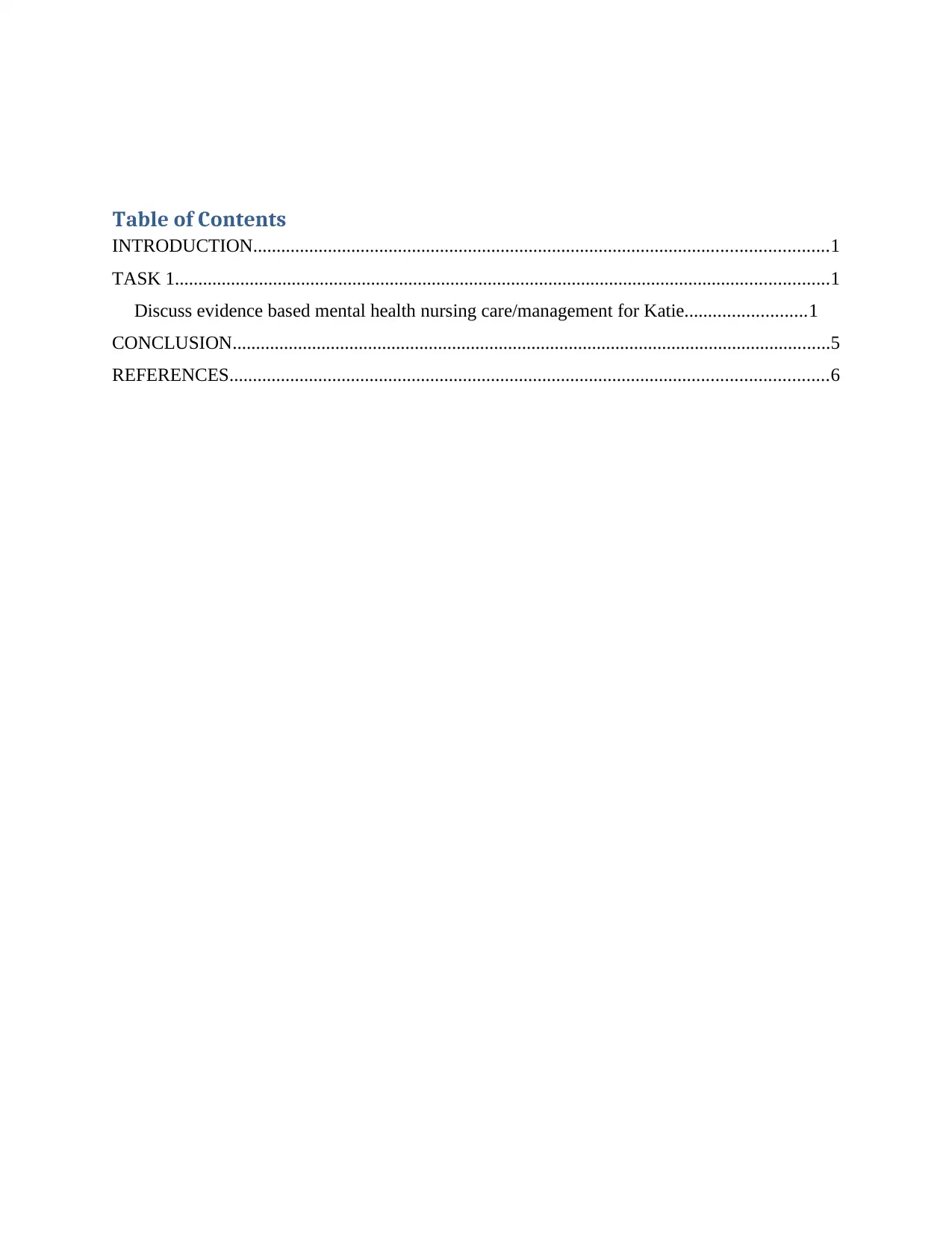
Table of Contents
INTRODUCTION...........................................................................................................................1
TASK 1............................................................................................................................................1
Discuss evidence based mental health nursing care/management for Katie..........................1
CONCLUSION................................................................................................................................5
REFERENCES................................................................................................................................6
INTRODUCTION...........................................................................................................................1
TASK 1............................................................................................................................................1
Discuss evidence based mental health nursing care/management for Katie..........................1
CONCLUSION................................................................................................................................5
REFERENCES................................................................................................................................6
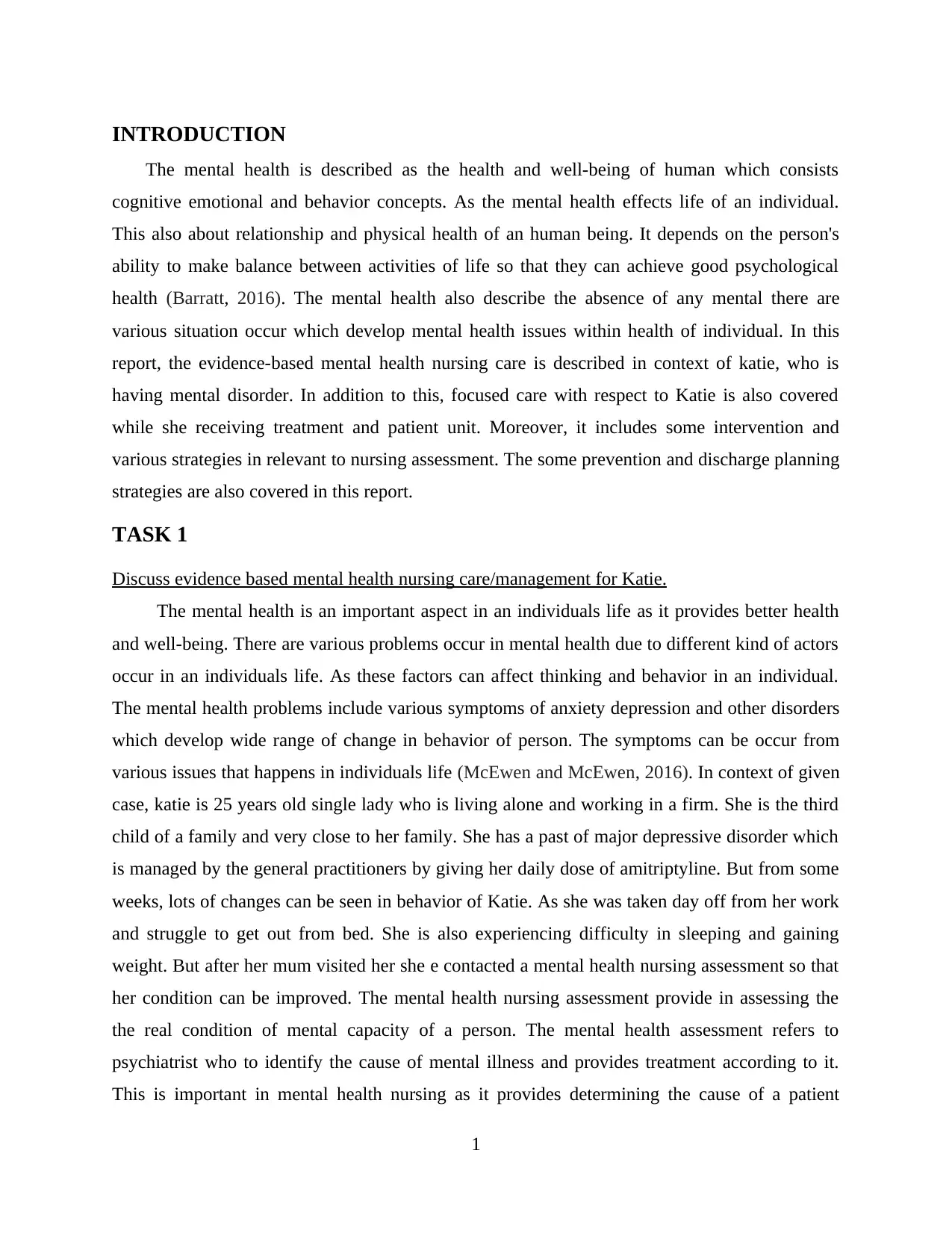
INTRODUCTION
The mental health is described as the health and well-being of human which consists
cognitive emotional and behavior concepts. As the mental health effects life of an individual.
This also about relationship and physical health of an human being. It depends on the person's
ability to make balance between activities of life so that they can achieve good psychological
health (Barratt, 2016). The mental health also describe the absence of any mental there are
various situation occur which develop mental health issues within health of individual. In this
report, the evidence-based mental health nursing care is described in context of katie, who is
having mental disorder. In addition to this, focused care with respect to Katie is also covered
while she receiving treatment and patient unit. Moreover, it includes some intervention and
various strategies in relevant to nursing assessment. The some prevention and discharge planning
strategies are also covered in this report.
TASK 1
Discuss evidence based mental health nursing care/management for Katie.
The mental health is an important aspect in an individuals life as it provides better health
and well-being. There are various problems occur in mental health due to different kind of actors
occur in an individuals life. As these factors can affect thinking and behavior in an individual.
The mental health problems include various symptoms of anxiety depression and other disorders
which develop wide range of change in behavior of person. The symptoms can be occur from
various issues that happens in individuals life (McEwen and McEwen, 2016). In context of given
case, katie is 25 years old single lady who is living alone and working in a firm. She is the third
child of a family and very close to her family. She has a past of major depressive disorder which
is managed by the general practitioners by giving her daily dose of amitriptyline. But from some
weeks, lots of changes can be seen in behavior of Katie. As she was taken day off from her work
and struggle to get out from bed. She is also experiencing difficulty in sleeping and gaining
weight. But after her mum visited her she e contacted a mental health nursing assessment so that
her condition can be improved. The mental health nursing assessment provide in assessing the
the real condition of mental capacity of a person. The mental health assessment refers to
psychiatrist who to identify the cause of mental illness and provides treatment according to it.
This is important in mental health nursing as it provides determining the cause of a patient
1
The mental health is described as the health and well-being of human which consists
cognitive emotional and behavior concepts. As the mental health effects life of an individual.
This also about relationship and physical health of an human being. It depends on the person's
ability to make balance between activities of life so that they can achieve good psychological
health (Barratt, 2016). The mental health also describe the absence of any mental there are
various situation occur which develop mental health issues within health of individual. In this
report, the evidence-based mental health nursing care is described in context of katie, who is
having mental disorder. In addition to this, focused care with respect to Katie is also covered
while she receiving treatment and patient unit. Moreover, it includes some intervention and
various strategies in relevant to nursing assessment. The some prevention and discharge planning
strategies are also covered in this report.
TASK 1
Discuss evidence based mental health nursing care/management for Katie.
The mental health is an important aspect in an individuals life as it provides better health
and well-being. There are various problems occur in mental health due to different kind of actors
occur in an individuals life. As these factors can affect thinking and behavior in an individual.
The mental health problems include various symptoms of anxiety depression and other disorders
which develop wide range of change in behavior of person. The symptoms can be occur from
various issues that happens in individuals life (McEwen and McEwen, 2016). In context of given
case, katie is 25 years old single lady who is living alone and working in a firm. She is the third
child of a family and very close to her family. She has a past of major depressive disorder which
is managed by the general practitioners by giving her daily dose of amitriptyline. But from some
weeks, lots of changes can be seen in behavior of Katie. As she was taken day off from her work
and struggle to get out from bed. She is also experiencing difficulty in sleeping and gaining
weight. But after her mum visited her she e contacted a mental health nursing assessment so that
her condition can be improved. The mental health nursing assessment provide in assessing the
the real condition of mental capacity of a person. The mental health assessment refers to
psychiatrist who to identify the cause of mental illness and provides treatment according to it.
This is important in mental health nursing as it provides determining the cause of a patient
1
⊘ This is a preview!⊘
Do you want full access?
Subscribe today to unlock all pages.

Trusted by 1+ million students worldwide
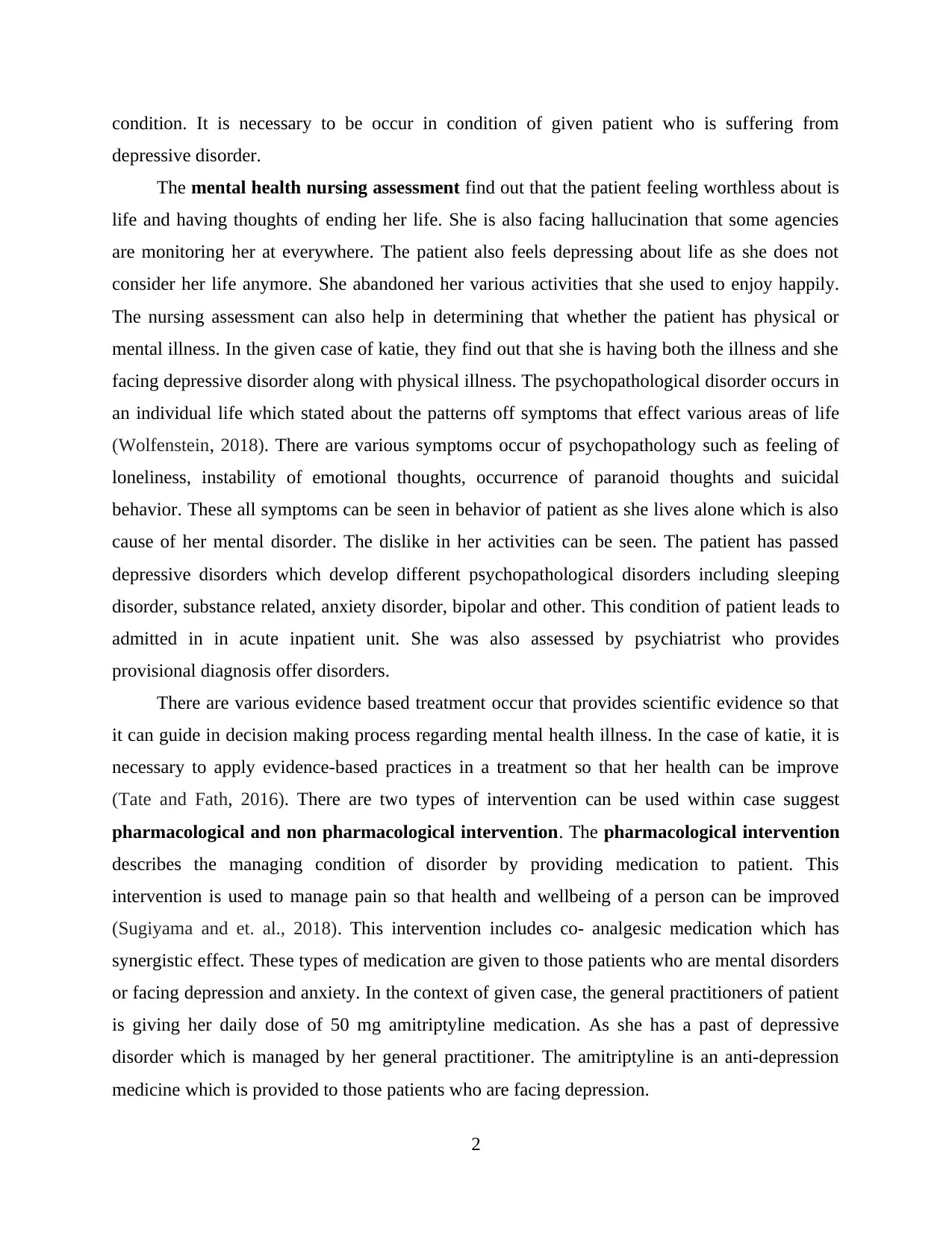
condition. It is necessary to be occur in condition of given patient who is suffering from
depressive disorder.
The mental health nursing assessment find out that the patient feeling worthless about is
life and having thoughts of ending her life. She is also facing hallucination that some agencies
are monitoring her at everywhere. The patient also feels depressing about life as she does not
consider her life anymore. She abandoned her various activities that she used to enjoy happily.
The nursing assessment can also help in determining that whether the patient has physical or
mental illness. In the given case of katie, they find out that she is having both the illness and she
facing depressive disorder along with physical illness. The psychopathological disorder occurs in
an individual life which stated about the patterns off symptoms that effect various areas of life
(Wolfenstein, 2018). There are various symptoms occur of psychopathology such as feeling of
loneliness, instability of emotional thoughts, occurrence of paranoid thoughts and suicidal
behavior. These all symptoms can be seen in behavior of patient as she lives alone which is also
cause of her mental disorder. The dislike in her activities can be seen. The patient has passed
depressive disorders which develop different psychopathological disorders including sleeping
disorder, substance related, anxiety disorder, bipolar and other. This condition of patient leads to
admitted in in acute inpatient unit. She was also assessed by psychiatrist who provides
provisional diagnosis offer disorders.
There are various evidence based treatment occur that provides scientific evidence so that
it can guide in decision making process regarding mental health illness. In the case of katie, it is
necessary to apply evidence-based practices in a treatment so that her health can be improve
(Tate and Fath, 2016). There are two types of intervention can be used within case suggest
pharmacological and non pharmacological intervention. The pharmacological intervention
describes the managing condition of disorder by providing medication to patient. This
intervention is used to manage pain so that health and wellbeing of a person can be improved
(Sugiyama and et. al., 2018). This intervention includes co- analgesic medication which has
synergistic effect. These types of medication are given to those patients who are mental disorders
or facing depression and anxiety. In the context of given case, the general practitioners of patient
is giving her daily dose of 50 mg amitriptyline medication. As she has a past of depressive
disorder which is managed by her general practitioner. The amitriptyline is an anti-depression
medicine which is provided to those patients who are facing depression.
2
depressive disorder.
The mental health nursing assessment find out that the patient feeling worthless about is
life and having thoughts of ending her life. She is also facing hallucination that some agencies
are monitoring her at everywhere. The patient also feels depressing about life as she does not
consider her life anymore. She abandoned her various activities that she used to enjoy happily.
The nursing assessment can also help in determining that whether the patient has physical or
mental illness. In the given case of katie, they find out that she is having both the illness and she
facing depressive disorder along with physical illness. The psychopathological disorder occurs in
an individual life which stated about the patterns off symptoms that effect various areas of life
(Wolfenstein, 2018). There are various symptoms occur of psychopathology such as feeling of
loneliness, instability of emotional thoughts, occurrence of paranoid thoughts and suicidal
behavior. These all symptoms can be seen in behavior of patient as she lives alone which is also
cause of her mental disorder. The dislike in her activities can be seen. The patient has passed
depressive disorders which develop different psychopathological disorders including sleeping
disorder, substance related, anxiety disorder, bipolar and other. This condition of patient leads to
admitted in in acute inpatient unit. She was also assessed by psychiatrist who provides
provisional diagnosis offer disorders.
There are various evidence based treatment occur that provides scientific evidence so that
it can guide in decision making process regarding mental health illness. In the case of katie, it is
necessary to apply evidence-based practices in a treatment so that her health can be improve
(Tate and Fath, 2016). There are two types of intervention can be used within case suggest
pharmacological and non pharmacological intervention. The pharmacological intervention
describes the managing condition of disorder by providing medication to patient. This
intervention is used to manage pain so that health and wellbeing of a person can be improved
(Sugiyama and et. al., 2018). This intervention includes co- analgesic medication which has
synergistic effect. These types of medication are given to those patients who are mental disorders
or facing depression and anxiety. In the context of given case, the general practitioners of patient
is giving her daily dose of 50 mg amitriptyline medication. As she has a past of depressive
disorder which is managed by her general practitioner. The amitriptyline is an anti-depression
medicine which is provided to those patients who are facing depression.
2
Paraphrase This Document
Need a fresh take? Get an instant paraphrase of this document with our AI Paraphraser
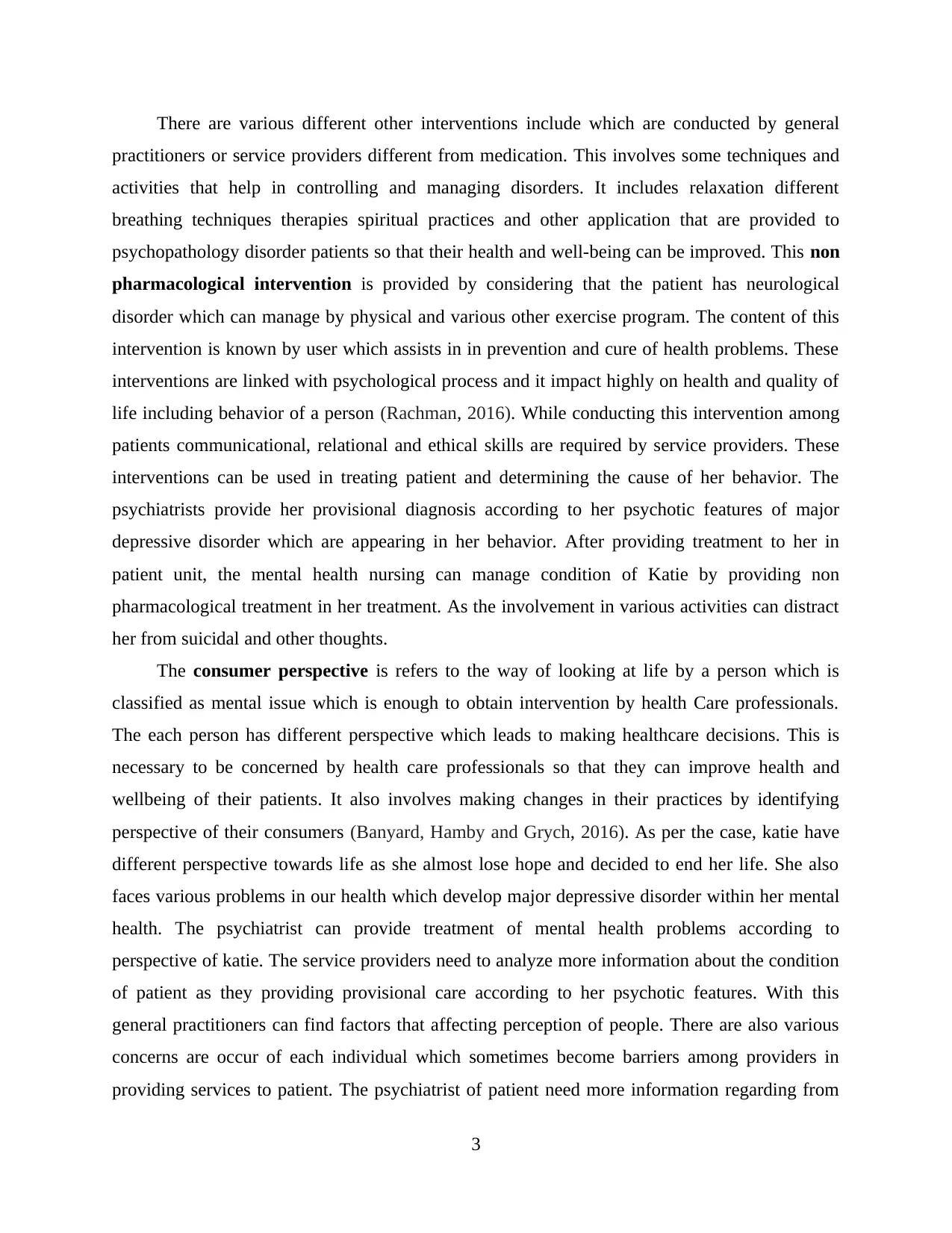
There are various different other interventions include which are conducted by general
practitioners or service providers different from medication. This involves some techniques and
activities that help in controlling and managing disorders. It includes relaxation different
breathing techniques therapies spiritual practices and other application that are provided to
psychopathology disorder patients so that their health and well-being can be improved. This non
pharmacological intervention is provided by considering that the patient has neurological
disorder which can manage by physical and various other exercise program. The content of this
intervention is known by user which assists in in prevention and cure of health problems. These
interventions are linked with psychological process and it impact highly on health and quality of
life including behavior of a person (Rachman, 2016). While conducting this intervention among
patients communicational, relational and ethical skills are required by service providers. These
interventions can be used in treating patient and determining the cause of her behavior. The
psychiatrists provide her provisional diagnosis according to her psychotic features of major
depressive disorder which are appearing in her behavior. After providing treatment to her in
patient unit, the mental health nursing can manage condition of Katie by providing non
pharmacological treatment in her treatment. As the involvement in various activities can distract
her from suicidal and other thoughts.
The consumer perspective is refers to the way of looking at life by a person which is
classified as mental issue which is enough to obtain intervention by health Care professionals.
The each person has different perspective which leads to making healthcare decisions. This is
necessary to be concerned by health care professionals so that they can improve health and
wellbeing of their patients. It also involves making changes in their practices by identifying
perspective of their consumers (Banyard, Hamby and Grych, 2016). As per the case, katie have
different perspective towards life as she almost lose hope and decided to end her life. She also
faces various problems in our health which develop major depressive disorder within her mental
health. The psychiatrist can provide treatment of mental health problems according to
perspective of katie. The service providers need to analyze more information about the condition
of patient as they providing provisional care according to her psychotic features. With this
general practitioners can find factors that affecting perception of people. There are also various
concerns are occur of each individual which sometimes become barriers among providers in
providing services to patient. The psychiatrist of patient need more information regarding from
3
practitioners or service providers different from medication. This involves some techniques and
activities that help in controlling and managing disorders. It includes relaxation different
breathing techniques therapies spiritual practices and other application that are provided to
psychopathology disorder patients so that their health and well-being can be improved. This non
pharmacological intervention is provided by considering that the patient has neurological
disorder which can manage by physical and various other exercise program. The content of this
intervention is known by user which assists in in prevention and cure of health problems. These
interventions are linked with psychological process and it impact highly on health and quality of
life including behavior of a person (Rachman, 2016). While conducting this intervention among
patients communicational, relational and ethical skills are required by service providers. These
interventions can be used in treating patient and determining the cause of her behavior. The
psychiatrists provide her provisional diagnosis according to her psychotic features of major
depressive disorder which are appearing in her behavior. After providing treatment to her in
patient unit, the mental health nursing can manage condition of Katie by providing non
pharmacological treatment in her treatment. As the involvement in various activities can distract
her from suicidal and other thoughts.
The consumer perspective is refers to the way of looking at life by a person which is
classified as mental issue which is enough to obtain intervention by health Care professionals.
The each person has different perspective which leads to making healthcare decisions. This is
necessary to be concerned by health care professionals so that they can improve health and
wellbeing of their patients. It also involves making changes in their practices by identifying
perspective of their consumers (Banyard, Hamby and Grych, 2016). As per the case, katie have
different perspective towards life as she almost lose hope and decided to end her life. She also
faces various problems in our health which develop major depressive disorder within her mental
health. The psychiatrist can provide treatment of mental health problems according to
perspective of katie. The service providers need to analyze more information about the condition
of patient as they providing provisional care according to her psychotic features. With this
general practitioners can find factors that affecting perception of people. There are also various
concerns are occur of each individual which sometimes become barriers among providers in
providing services to patient. The psychiatrist of patient need more information regarding from
3
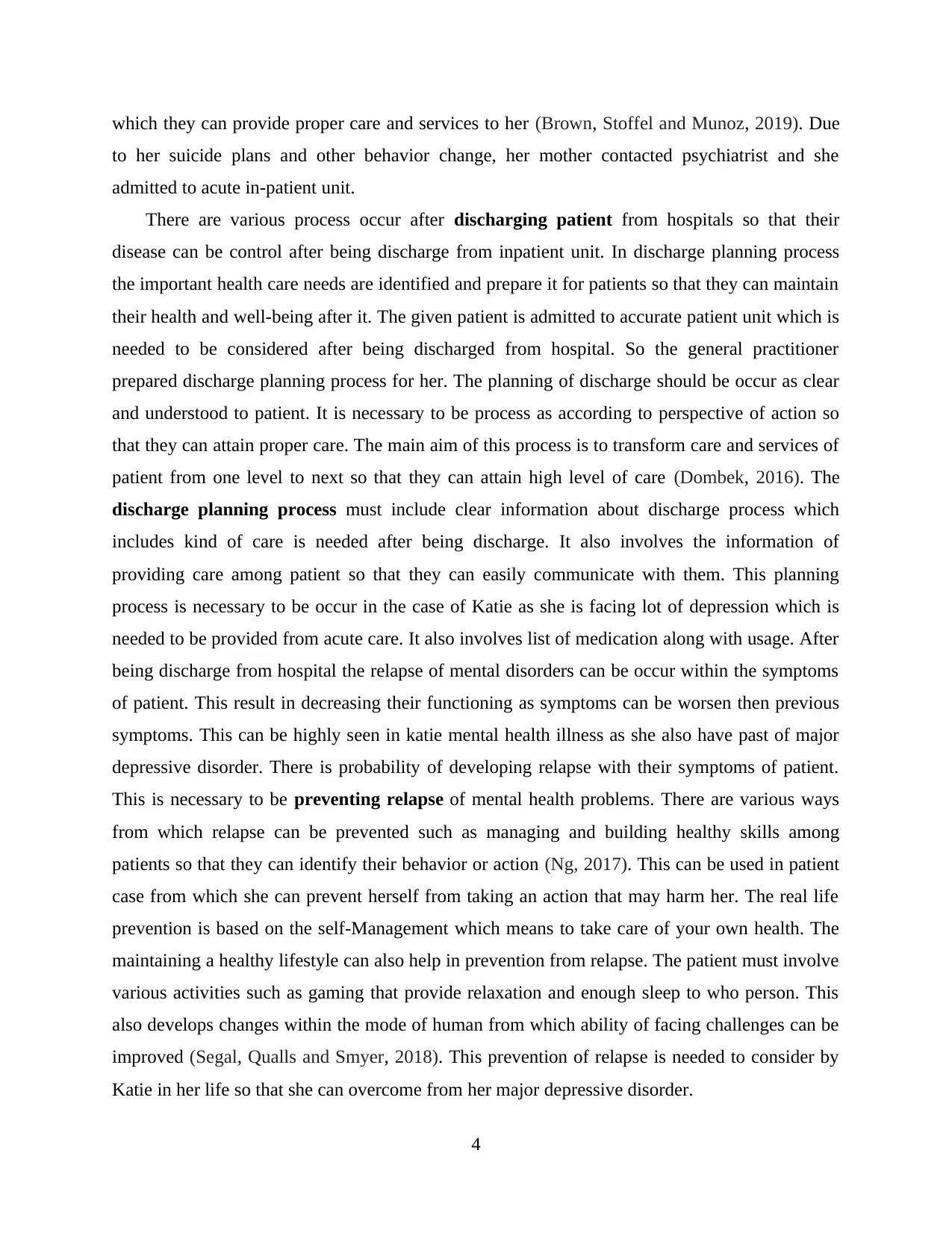
which they can provide proper care and services to her (Brown, Stoffel and Munoz, 2019). Due
to her suicide plans and other behavior change, her mother contacted psychiatrist and she
admitted to acute in-patient unit.
There are various process occur after discharging patient from hospitals so that their
disease can be control after being discharge from inpatient unit. In discharge planning process
the important health care needs are identified and prepare it for patients so that they can maintain
their health and well-being after it. The given patient is admitted to accurate patient unit which is
needed to be considered after being discharged from hospital. So the general practitioner
prepared discharge planning process for her. The planning of discharge should be occur as clear
and understood to patient. It is necessary to be process as according to perspective of action so
that they can attain proper care. The main aim of this process is to transform care and services of
patient from one level to next so that they can attain high level of care (Dombek, 2016). The
discharge planning process must include clear information about discharge process which
includes kind of care is needed after being discharge. It also involves the information of
providing care among patient so that they can easily communicate with them. This planning
process is necessary to be occur in the case of Katie as she is facing lot of depression which is
needed to be provided from acute care. It also involves list of medication along with usage. After
being discharge from hospital the relapse of mental disorders can be occur within the symptoms
of patient. This result in decreasing their functioning as symptoms can be worsen then previous
symptoms. This can be highly seen in katie mental health illness as she also have past of major
depressive disorder. There is probability of developing relapse with their symptoms of patient.
This is necessary to be preventing relapse of mental health problems. There are various ways
from which relapse can be prevented such as managing and building healthy skills among
patients so that they can identify their behavior or action (Ng, 2017). This can be used in patient
case from which she can prevent herself from taking an action that may harm her. The real life
prevention is based on the self-Management which means to take care of your own health. The
maintaining a healthy lifestyle can also help in prevention from relapse. The patient must involve
various activities such as gaming that provide relaxation and enough sleep to who person. This
also develops changes within the mode of human from which ability of facing challenges can be
improved (Segal, Qualls and Smyer, 2018). This prevention of relapse is needed to consider by
Katie in her life so that she can overcome from her major depressive disorder.
4
to her suicide plans and other behavior change, her mother contacted psychiatrist and she
admitted to acute in-patient unit.
There are various process occur after discharging patient from hospitals so that their
disease can be control after being discharge from inpatient unit. In discharge planning process
the important health care needs are identified and prepare it for patients so that they can maintain
their health and well-being after it. The given patient is admitted to accurate patient unit which is
needed to be considered after being discharged from hospital. So the general practitioner
prepared discharge planning process for her. The planning of discharge should be occur as clear
and understood to patient. It is necessary to be process as according to perspective of action so
that they can attain proper care. The main aim of this process is to transform care and services of
patient from one level to next so that they can attain high level of care (Dombek, 2016). The
discharge planning process must include clear information about discharge process which
includes kind of care is needed after being discharge. It also involves the information of
providing care among patient so that they can easily communicate with them. This planning
process is necessary to be occur in the case of Katie as she is facing lot of depression which is
needed to be provided from acute care. It also involves list of medication along with usage. After
being discharge from hospital the relapse of mental disorders can be occur within the symptoms
of patient. This result in decreasing their functioning as symptoms can be worsen then previous
symptoms. This can be highly seen in katie mental health illness as she also have past of major
depressive disorder. There is probability of developing relapse with their symptoms of patient.
This is necessary to be preventing relapse of mental health problems. There are various ways
from which relapse can be prevented such as managing and building healthy skills among
patients so that they can identify their behavior or action (Ng, 2017). This can be used in patient
case from which she can prevent herself from taking an action that may harm her. The real life
prevention is based on the self-Management which means to take care of your own health. The
maintaining a healthy lifestyle can also help in prevention from relapse. The patient must involve
various activities such as gaming that provide relaxation and enough sleep to who person. This
also develops changes within the mode of human from which ability of facing challenges can be
improved (Segal, Qualls and Smyer, 2018). This prevention of relapse is needed to consider by
Katie in her life so that she can overcome from her major depressive disorder.
4
⊘ This is a preview!⊘
Do you want full access?
Subscribe today to unlock all pages.

Trusted by 1+ million students worldwide
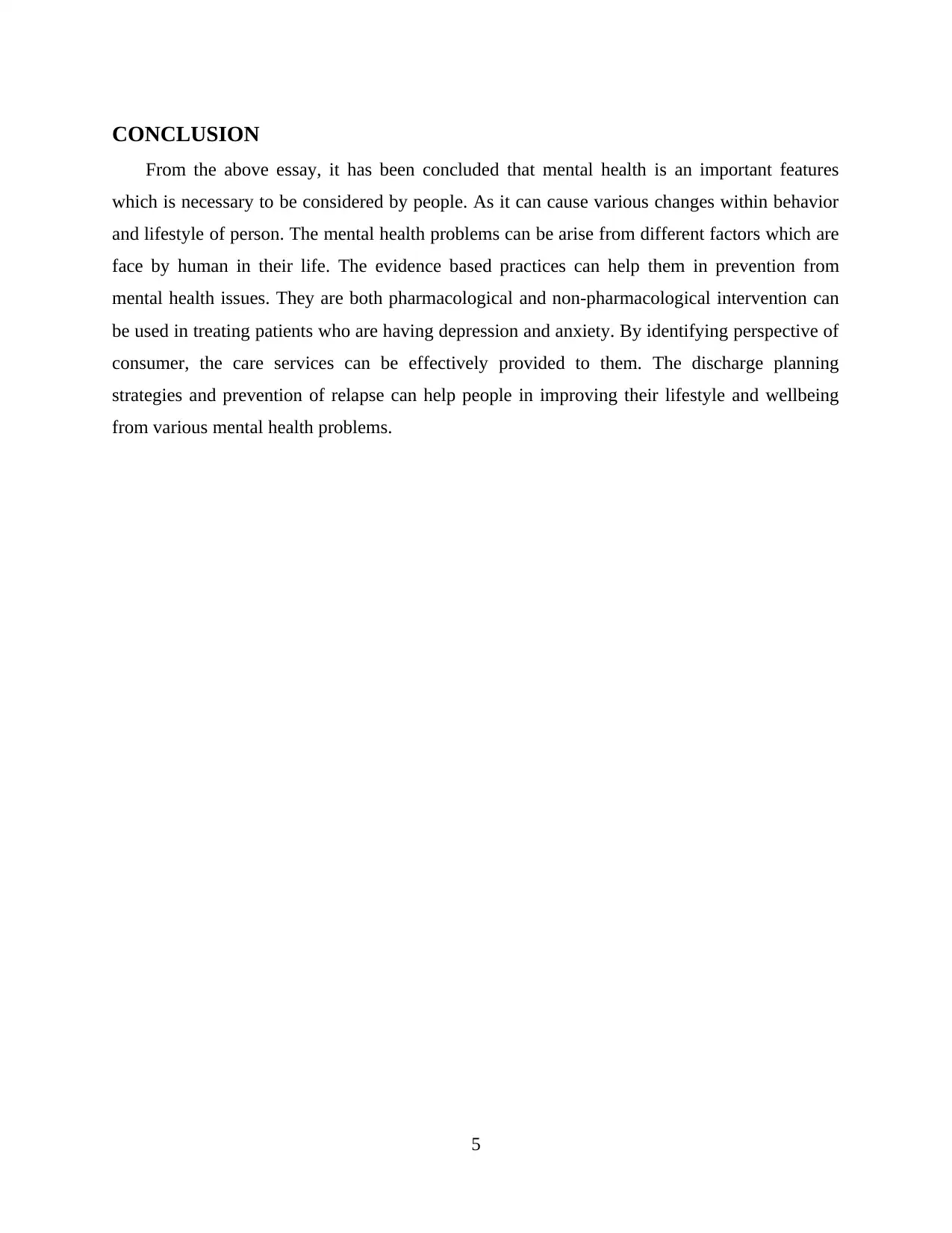
CONCLUSION
From the above essay, it has been concluded that mental health is an important features
which is necessary to be considered by people. As it can cause various changes within behavior
and lifestyle of person. The mental health problems can be arise from different factors which are
face by human in their life. The evidence based practices can help them in prevention from
mental health issues. They are both pharmacological and non-pharmacological intervention can
be used in treating patients who are having depression and anxiety. By identifying perspective of
consumer, the care services can be effectively provided to them. The discharge planning
strategies and prevention of relapse can help people in improving their lifestyle and wellbeing
from various mental health problems.
5
From the above essay, it has been concluded that mental health is an important features
which is necessary to be considered by people. As it can cause various changes within behavior
and lifestyle of person. The mental health problems can be arise from different factors which are
face by human in their life. The evidence based practices can help them in prevention from
mental health issues. They are both pharmacological and non-pharmacological intervention can
be used in treating patients who are having depression and anxiety. By identifying perspective of
consumer, the care services can be effectively provided to them. The discharge planning
strategies and prevention of relapse can help people in improving their lifestyle and wellbeing
from various mental health problems.
5
Paraphrase This Document
Need a fresh take? Get an instant paraphrase of this document with our AI Paraphraser
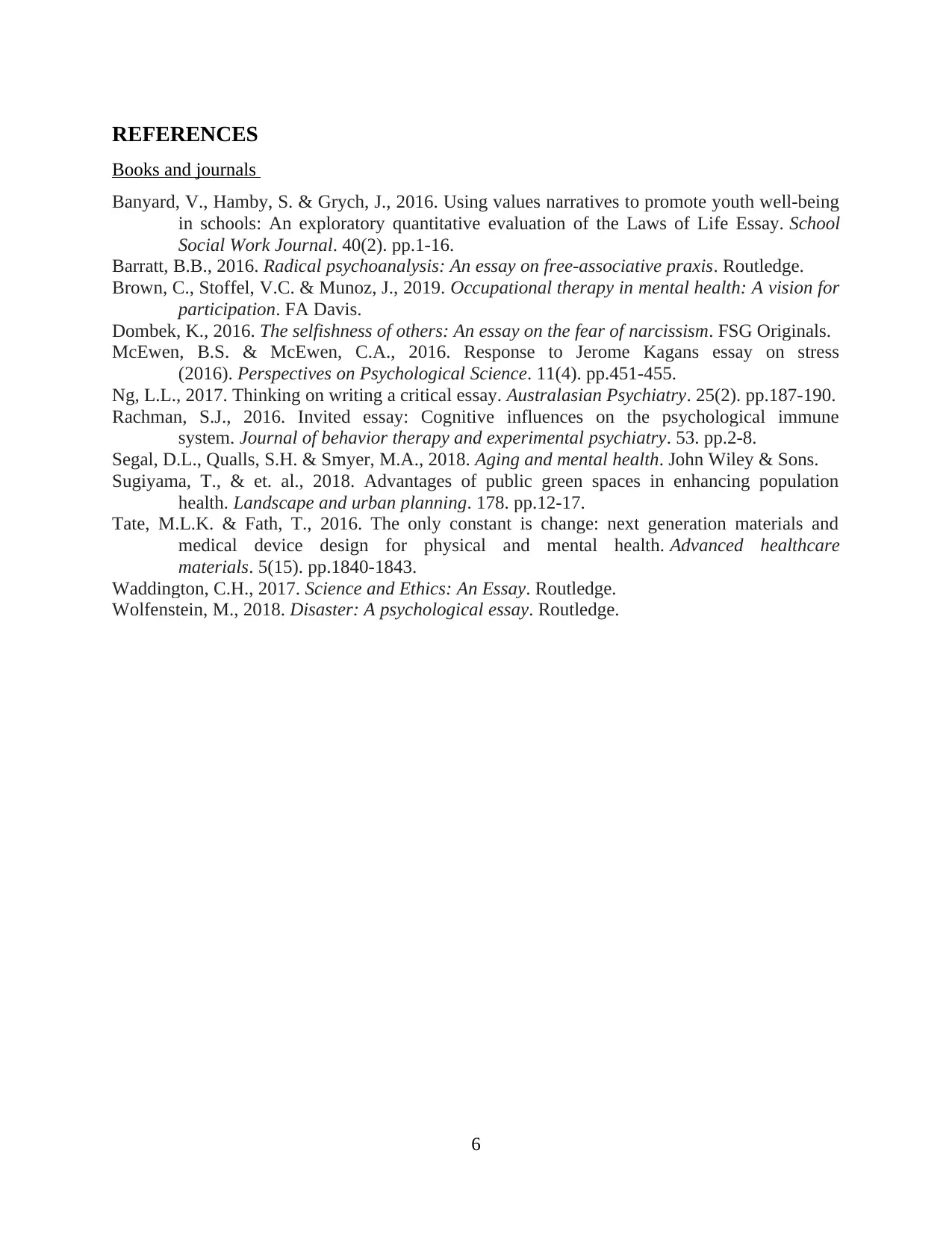
REFERENCES
Books and journals
Banyard, V., Hamby, S. & Grych, J., 2016. Using values narratives to promote youth well-being
in schools: An exploratory quantitative evaluation of the Laws of Life Essay. School
Social Work Journal. 40(2). pp.1-16.
Barratt, B.B., 2016. Radical psychoanalysis: An essay on free-associative praxis. Routledge.
Brown, C., Stoffel, V.C. & Munoz, J., 2019. Occupational therapy in mental health: A vision for
participation. FA Davis.
Dombek, K., 2016. The selfishness of others: An essay on the fear of narcissism. FSG Originals.
McEwen, B.S. & McEwen, C.A., 2016. Response to Jerome Kagans essay on stress
(2016). Perspectives on Psychological Science. 11(4). pp.451-455.
Ng, L.L., 2017. Thinking on writing a critical essay. Australasian Psychiatry. 25(2). pp.187-190.
Rachman, S.J., 2016. Invited essay: Cognitive influences on the psychological immune
system. Journal of behavior therapy and experimental psychiatry. 53. pp.2-8.
Segal, D.L., Qualls, S.H. & Smyer, M.A., 2018. Aging and mental health. John Wiley & Sons.
Sugiyama, T., & et. al., 2018. Advantages of public green spaces in enhancing population
health. Landscape and urban planning. 178. pp.12-17.
Tate, M.L.K. & Fath, T., 2016. The only constant is change: next generation materials and
medical device design for physical and mental health. Advanced healthcare
materials. 5(15). pp.1840-1843.
Waddington, C.H., 2017. Science and Ethics: An Essay. Routledge.
Wolfenstein, M., 2018. Disaster: A psychological essay. Routledge.
6
Books and journals
Banyard, V., Hamby, S. & Grych, J., 2016. Using values narratives to promote youth well-being
in schools: An exploratory quantitative evaluation of the Laws of Life Essay. School
Social Work Journal. 40(2). pp.1-16.
Barratt, B.B., 2016. Radical psychoanalysis: An essay on free-associative praxis. Routledge.
Brown, C., Stoffel, V.C. & Munoz, J., 2019. Occupational therapy in mental health: A vision for
participation. FA Davis.
Dombek, K., 2016. The selfishness of others: An essay on the fear of narcissism. FSG Originals.
McEwen, B.S. & McEwen, C.A., 2016. Response to Jerome Kagans essay on stress
(2016). Perspectives on Psychological Science. 11(4). pp.451-455.
Ng, L.L., 2017. Thinking on writing a critical essay. Australasian Psychiatry. 25(2). pp.187-190.
Rachman, S.J., 2016. Invited essay: Cognitive influences on the psychological immune
system. Journal of behavior therapy and experimental psychiatry. 53. pp.2-8.
Segal, D.L., Qualls, S.H. & Smyer, M.A., 2018. Aging and mental health. John Wiley & Sons.
Sugiyama, T., & et. al., 2018. Advantages of public green spaces in enhancing population
health. Landscape and urban planning. 178. pp.12-17.
Tate, M.L.K. & Fath, T., 2016. The only constant is change: next generation materials and
medical device design for physical and mental health. Advanced healthcare
materials. 5(15). pp.1840-1843.
Waddington, C.H., 2017. Science and Ethics: An Essay. Routledge.
Wolfenstein, M., 2018. Disaster: A psychological essay. Routledge.
6
1 out of 8
Related Documents
Your All-in-One AI-Powered Toolkit for Academic Success.
+13062052269
info@desklib.com
Available 24*7 on WhatsApp / Email
![[object Object]](/_next/static/media/star-bottom.7253800d.svg)
Unlock your academic potential
Copyright © 2020–2025 A2Z Services. All Rights Reserved. Developed and managed by ZUCOL.




![Mental Health and Wellbeing Report: [University Name], Semester 1](/_next/image/?url=https%3A%2F%2Fdesklib.com%2Fmedia%2Fimages%2Fob%2F76a73dbed3364ee18fbd23baba0664de.jpg&w=256&q=75)
